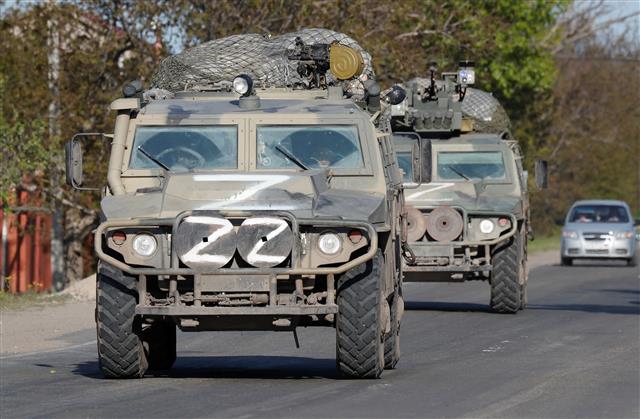London: Russian President Vladimir Putin on Wednesday called up 300,000 reservists to fight in Ukraine and backed a plan to annex parts of the country, hinting to the West he was prepared to use nuclear weapons to defend Russia.
It was Russia’s first such mobilisation since World War Two and signified the biggest escalation of the Ukraine war since Moscow’s Feb. 24 invasion.
It followed mounting casualties and battlefield setbacks for Russian forces, who have been driven from areas they had captured in northeast Ukraine in a Ukrainian counter-offensive this month and are bogged down in the south.
In an address to the Russian nation, Putin said: “If the territorial integrity of our country is threatened, we will use all available means to protect our people – this is not a bluff”. Russia had “lots of weapons to reply”, he said.
Ukraine and its Western allies responded by saying the move showed Russia’s campaign in Ukraine was failing. The allies pledged further support for President Volodymyr Zelenskiy’s government.
Russia’s defence minister said the partial mobilisation would see 300,000 reservists with previous military experience called up.
Although Russia has been involved in a number of conflicts since World War Two, this was the first such call-up since then.
Ukrainian presidential adviser Mykhailo Podolyak said it was a predictable step that would prove extremely unpopular.
“Absolutely predictable appeal, which looks more like an attempt to justify their own failure,” Podolyak told Reuters.
“The war is clearly not going according to Russia’s scenario.” Before Putin’s address, world leaders meeting at the United Nations in New York denounced the Russian invasion of Ukraine and plans for four occupied regions to hold referendums in the coming days on joining Russia.
Putin said the partial mobilisation of its 2 million-strong military reservists was to defend Russia and its territories.
The West did not want peace in Ukraine, he said.
He accused Washington, London, Brussels of pushing Kyiv to “transfer military operations to our territory”. Ukraine has sporadically struck targets inside Russia throughout the conflict, using long-range weapons supplied by the West.
“Nuclear blackmail has also been used,” Putin said, citing Ukraine’s Zaporozhzhia nuclear power plant. Russia and Ukraine have accused each other of endangering the plant in the fighting.
He also accused officials of NATO countries of making statements about “the possibility and admissibility of using weapons of mass destruction against Russia – nuclear weapons”.
“I want to remind you that our country also has various means of destruction, and in some components more modern than those of the NATO countries,” he said.
REFERENDUMS
Putin restated his aim was to “liberate” the Donbas, Ukraine’s industrial heartland, and said most people there did not want to return to what he called the “yoke” of Ukraine.
In an apparently coordinated move, pro-Russian regional leaders on Tuesday announced referendums for Sept. 23-27 in Luhansk, Donetsk, Kherson and Zaporizhzhia provinces, representing around 15% of Ukrainian territory.
Russia already considers Luhansk and Donetsk, which together make up the Donbas region that Moscow partially occupied in 2014, to be independent states. Ukraine and the West consider all parts of Ukraine held by Russian forces to be illegally occupied.
Russia now holds about 60% of Donetsk and had captured nearly all of Luhansk by July after slow advances during months of intense fighting.
Those gains are now under threat after Russian forces were driven from neighbouring Kharkiv province this month, losing control of their main supply lines for much of the Donetsk and Luhansk frontlines.
PROTESTS
The Russian opposition called for street protests against Putin’s mobilisation order.
Alexei Navalny, Russia’s most prominent opposition leader who is currently in prison, said Putin was sending more Russians to their death for a failing war.
The Vesna anti-war coalition said: “This means that thousands of Russian men – our fathers, brothers and husbands – will be thrown into the meat grinder of war.” “Now the war has come to every home and every family.” Russian Defence Minister Sergei Shoigu said on Wednesday 5,937 Russian soldiers had been killed since the start of the conflict. But the United States in July estimated Russia’s death toll at around 15,000.
German Chancellor Olaf Scholz, speaking to the U.N. General Assembly in New York, said Putin will only give up his “imperial ambitions” if he recognised he cannot win the war.
Ukraine’s neighbour Poland said Russia would attempt to destroy Ukraine and change its borders.
“We will do all we can with our allies, so that NATO supports Ukraine even more so that it can defend itself,” Polish Prime Minister Mateusz Morawiecki said.
U.S. ambassador to Ukraine Bridget Brink said Russia had shown weakness by announcing the mobilisation and setting out the referendums in the Russian-occupied territories.
Putin’s words also hit global markets, which have see-sawed since the invasion. The euro tumbled 0.7% against the dollar, European stock markets opened sharply lower, and investors piled into safe-haven bonds, pushing yields on German and U.S.
Michel Hewson, chief markets strategist, CMC Markets, said: “It’s the fact that he’s decided to dust off the nuclear card that obviously hasn’t gone down well … I think there is a perception that he’s really upped the ante, and how does the West respond to it?”
Putin calls the Russian action in Ukraine a “special military operation” to root out dangerous nationalists and “denazify” the country. The West says it is a land grab and an attempt to reconquer a country that broke free of Moscow’s rule with the break-up of the Soviet Union in 1991.
Nearly 6,000 civilians have been recorded as killed – many in artillery bombardments and air strikes – although the actual casualties are much higher, the United Nations says. About 9,000 Ukrainian military personnel had been killed, Kyiv says.


